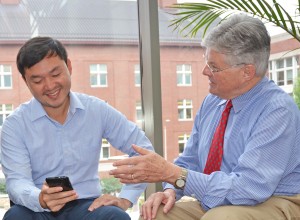Peers for Progress launches rebranded resource hub
February 11, 2016
Peers for Progress believes that ongoing peer support can be a key factor in managing health. The organization hosts a website that is the go-to source for cutting edge content, program materials and research briefs related to peer support.
“When Peers for Progress was launched in 2008, our vision was to create a website (peersforprogress.org/) where professionals and the general public could go to learn about the science behind peer support,” says Edwin Fisher, PhD, professor of health behavior at the Gillings School and global director of Peers for Progress. “We wanted to help people access best practices from the field, network with other peer support programs around the world and participate in advocacy that advances the role of peer support in health, health care and prevention.”
The original website was created under the auspices of the American Academy of Family Physicians Foundation, which hosted Peers for Progress during the early years of its growth. Today, the website is one of the top search engine results for “peer support” and attracts roughly 3,000 monthly visitors from around the globe.
The launch of a rebranded website reflects the fact that, in December 2015, Peers for Progress officially became part of the University of North Carolina at Chapel Hill, based in the UNC Gillings School of Global Public Health and UNC’s Department of Family Medicine. Their logos adjoin that of Peers for Progress at the top of the redesigned home page.
 Over time, Fisher and his colleagues at Peers for Progress plan to add content to the site that highlights additional UNC programs and activities that utilize and set global models for peer support.
Over time, Fisher and his colleagues at Peers for Progress plan to add content to the site that highlights additional UNC programs and activities that utilize and set global models for peer support.
“The website is primarily meant for researchers and program managers who are interested in peer support and wish to learn about the field,” Fisher explains. “Through our digital portal, they can access resources and models for program development and share findings that advance understanding of the role peer support can play in health interventions.”
Fisher shared the new website February 9-10 while participating in two meetings with the Nesta Health Lab (#NestaHealthLab) in London. On February 9, he joined David Halpern, PhD, chief executive of the British Government’s Behavioural Insights Team, to give a presentation on “Behavioural Change in Future Health and Care Systems.”
On February 10, Fisher joined Nesta in hosting the first meeting of a network of diabetes-focused peer support programs from across northern Europe. Representatives from Denmark, Finland, France, Germany, Holland and the United Kingdom exchanged resources, program models and benefits evaluations.
Fisher hopes the summit will grow into an ongoing network for the exchange of program ideas, models and evaluations as the mutual promotion of peer support grows on both sides of the Atlantic.
Share
Gillings School of Global Public Health contact: David Pesci, director of communications, (919) 962-2600 or dpesci@unc.edu

